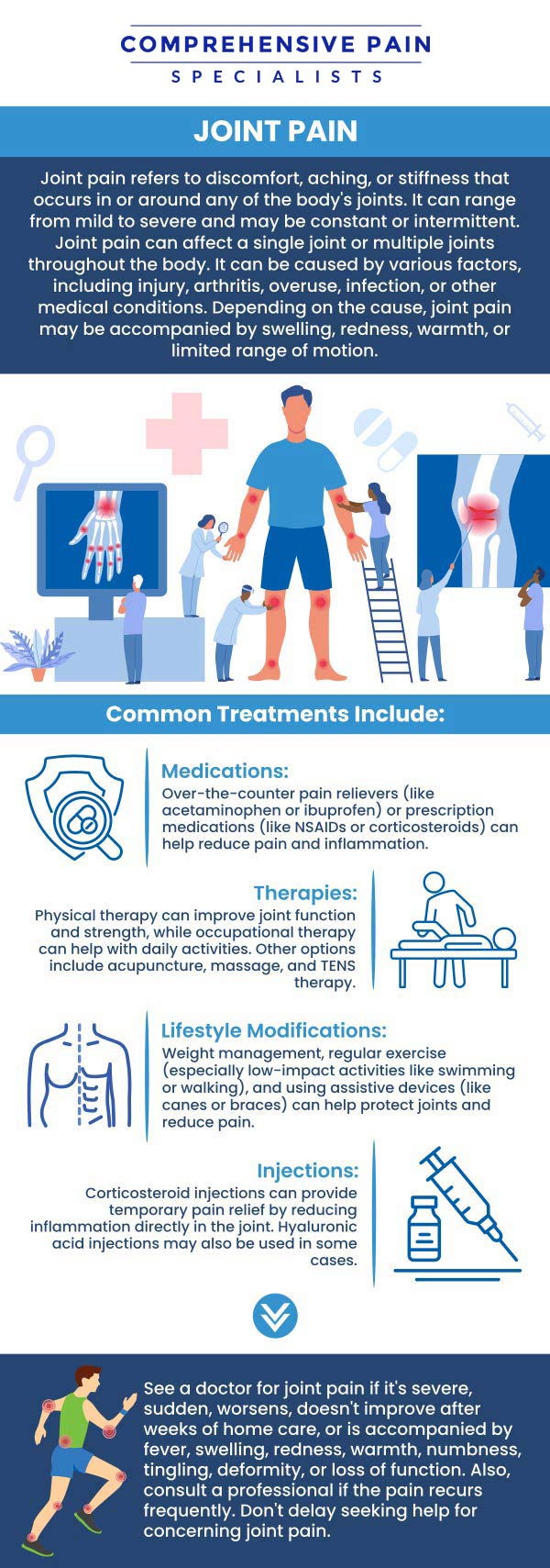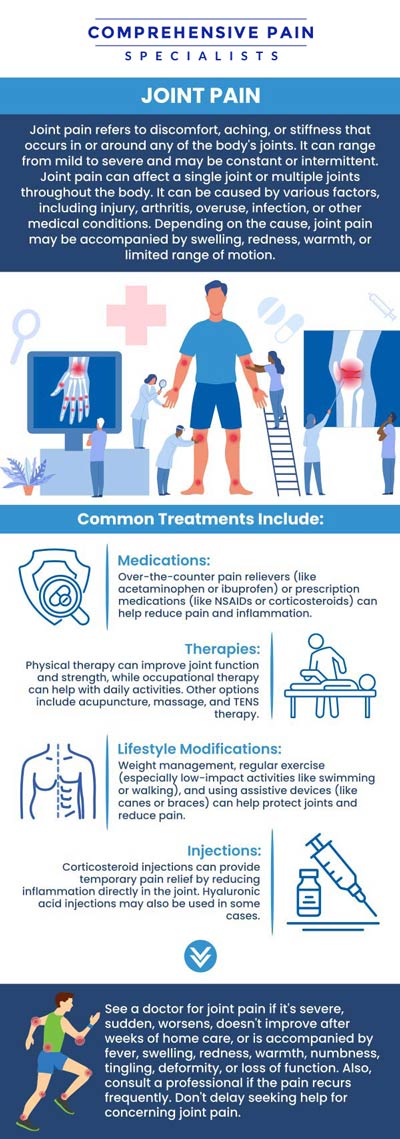Joint Pain Treatment Specialist in Wilkes-Barre, PA
Joint pain can result from various causes, including injuries, arthritis, overuse, infections, or underlying health conditions like gout or autoimmune diseases. It often leads to discomfort, swelling, stiffness, and limited mobility. Pain management professionals play a crucial role in diagnosing the root cause and creating personalized treatment plans. At Comprehensive Pain Specialists, our professionals address your joint pain comprehensively, helping you achieve relief, improved function, and enhanced quality of life. For more information, contact us or book an appointment online. We are located at 1177 PA-315, Dolphin Plaza, Wilkes-Barre, PA 18702.


Table of Contents:
What are the common causes of joint pain?
What lifestyle changes can reduce joint pain?
When should I see a doctor for joint pain?
What are the signs that joint pain might be due to arthritis?
Joint pain can arise from various causes, ranging from minor injuries to chronic conditions. Osteoarthritis is one of the most common causes, characterized by the gradual wearing down of cartilage in the joints, often due to aging, injury, or repetitive use. This condition typically worsens over time and leads to pain, stiffness, and limited mobility. Another prevalent cause is rheumatoid arthritis, an autoimmune disease that causes persistent joint inflammation, pain, and swelling. Our specialists are skilled at diagnosing these conditions and creating effective pain management strategies to help patients regain mobility and function.
Acute injuries such as sprains, strains, and fractures can also result in immediate joint pain, swelling, and difficulty moving the affected joint. These injuries are often treated using advanced diagnostic techniques, minimally invasive therapies, and rehabilitation programs to speed up recovery and minimize long-term discomfort.
In addition to these, conditions like gout, which results from the buildup of uric acid crystals in the joints, particularly the big toe, can cause intense pain and inflammation. Septic arthritis, an infection within the joint, is another serious condition that leads to significant discomfort. Prompt intervention is essential in managing these conditions and preventing complications.
Bursitis and tendinitis are other common causes of joint pain, often caused by repetitive motions or overuse, leading to inflammation of the tendons or bursae. Autoimmune diseases like lupus can also result in chronic joint pain and inflammation, requiring specialized treatment plans. Additionally, viral infections, such as influenza or hepatitis, may temporarily trigger joint discomfort, which we manage through supportive care.
Joint pain can also be exacerbated by osteoporosis, a condition where bone density decreases, leading to an increased risk of fractures and joint instability. Lastly, obesity places extra stress on weight-bearing joints, such as the knees and hips, accelerating wear and tear, which often leads to joint pain.
Persistent joint pain can greatly impact your quality of life. Our team of dedicated pain management experts is committed to providing personalized care and guidance, helping you adopt lifestyle modifications that effectively manage symptoms and optimize joint health.
Maintaining a Healthy Weight
Excess weight puts strain on joints, especially in the knees, hips, and back. Losing even a small amount of weight can help reduce joint pain, inflammation, and improve mobility.
Customized Exercise Programs
Tailored exercise routines can strengthen muscles, enhance flexibility, and improve joint stability. Personalized programs reduce inflammation, boost circulation, and improve joint function without causing additional discomfort.
Dietary Guidance for Joint Health
A diet rich in anti-inflammatory foods, such as omega-3 fatty acids (salmon, mackerel, walnuts) and antioxidant-rich fruits, vegetables, and whole grains, can alleviate inflammation and support long-term joint health.
Improving Posture and Ergonomics
Maintaining good posture and proper ergonomics can reduce joint stress and prevent further discomfort. Education on correct posture and ergonomic practices can help align joints and enhance overall joint health.
Managing Stress and Sleep Quality
Stress and poor sleep can worsen joint pain and inflammation. Our clinic promotes mindfulness, meditation, and relaxation techniques to help reduce pain perception and improve sleep, which are both critical for managing chronic pain.
Avoiding Harmful Habits
Smoking and excessive alcohol use can increase inflammation and weaken bone density. Our specialists help patients reduce these habits to improve joint health and decrease pain severity.
Joint pain can significantly impact your quality of life, ranging from mild discomfort to severe, debilitating symptoms. Our expert providers are dedicated to diagnosing and treating joint pain to restore your comfort, mobility, and overall well-being.
While minor joint discomfort can often be managed with rest and self-care measures, certain situations require prompt medical evaluation. You should seek specialized care from Comprehensive Pain Specialists if your joint pain persists beyond several days, progressively worsens, or interferes significantly with your daily activities. Additionally, joint pain accompanied by swelling, redness, warmth, tenderness, or stiffness that restricts your range of motion warrants professional evaluation.
Immediate medical attention is advised if you experience joint pain following an injury, especially if the affected joint shows signs of deformity, rapid swelling, or an inability to move or bear weight. Symptoms such as fever, unexplained weight loss, or extreme fatigue alongside joint discomfort may indicate underlying inflammatory or autoimmune conditions that require specialized assessment and targeted interventions.
If joint pain disrupts your sleep or does not improve with rest, over-the-counter medications, or standard self-care approaches, Comprehensive Pain Specialists can provide advanced diagnostics, personalized treatment plans, and comprehensive pain management solutions.
Joint pain can significantly impact your daily life, and arthritis is one of its most common causes. At Comprehensive Pain Specialists, our experienced team understands the unique challenges arthritis-related joint pain presents and is committed to delivering effective, personalized care to help you regain your quality of life.
Arthritis often presents with persistent or recurring discomfort in the joints, frequently accompanied by stiffness. This stiffness is usually more noticeable in the morning or following periods of inactivity and tends to improve with gentle, guided movement. You may also experience swelling and tenderness around affected joints, indicating inflammation within the joint spaces.
Patients commonly report joint pain that worsens following increased physical activity or prolonged use, leading to discomfort that can intensify over time. Many individuals also notice reduced range of motion, making everyday activities such as bending or fully straightening joints increasingly challenging. The affected areas may feel warm or appear visibly red, especially with inflammatory forms of arthritis like rheumatoid arthritis.
Another notable sign of arthritis is symmetrical joint pain, affecting similar joints on both sides of the body simultaneously, such as both knees, wrists, or hands. Additionally, arthritis-related joint pain may be accompanied by systemic symptoms, including fatigue or general malaise, particularly in inflammatory arthritis conditions.
We emphasize early evaluation and accurate diagnosis to develop tailored treatment plans. If you’re experiencing persistent joint discomfort, worsening pain, swelling, stiffness, or reduced mobility, contact us or book an appointment online. We are located at 1177 PA-315, Dolphin Plaza, Wilkes-Barre, PA 18702. We serve patients from Wilkes-Barre PA, Glen Lyon PA, Dallas PA, Pittston PA, Mountain Top PA, Plymouth PA, and surrounding areas.

Additional Services You May Need
• Back Pain
• Neck Pain
• Joint Pain
• Shoulder Pain
• Hip Pain
• Knee Pain
• Arthritis
• Osteoarthritis
• Rheumatoid Arthritis
• Fibromyalgia
• Sciatica
• Complex Regional Pain Syndrome
• Neuropathic Pain
• Nerve Pain
• Diabetic Neuropathy
• Postherpetic Neuralgia
• Myofascial Pain Syndrome
• Headaches & Migraines
• Cancer-Related Pain
• Chronic Pain
• Failed Back Surgery
• Failed Neck Surgery
• Spinal Arthritis
• Aurora Zip
• Caudal Epidural Steroid Injection
• Cervical Epidural Steroid Injection
• Cervical Facet Radiofrequency Neurotomy
• Lumbar Radiofrequency Neurotomy
• Tenotomie
• Herniated Disc
• Bulging Disc
• Degenerative Disc Disease
• Spinal Stenosis
• Facet Joint Syndrome
• Pinched Nerve
• Spondylosis
• Spondyloisthesis
• Work-Related Injury
• Sports Injury
• Whipash
• Concussion
• Car Accident Injury
• Post-Surgical Pain
• Fracture-Related Pain
• Trigeminal Neuralgia
• Phantom Limb Pain
• Sacroiliac Joint Dysfunction
• Coccydynia
• Sacroiliac Joint Steroid Injection
• Vertiflex Superion Procedure
• Viadisc
• Head Injuries
• Muscle Spasm
• Stem Cell Therapy
• Lumbar Epidural Steroid Injection
• Medial Branch Block
• Sacroiliac Joint Fusions

Additional Services You May Need
• Back Pain
• Neck Pain
• Joint Pain
• Shoulder Pain
• Hip Pain
• Knee Pain
• Arthritis
• Osteoarthritis
• Rheumatoid Arthritis
• Fibromyalgia
• Sciatica
• Complex Regional Pain Syndrome
• Neuropathic Pain
• Nerve Pain
• Diabetic Neuropathy
• Postherpetic Neuralgia
• Myofascial Pain Syndrome
• Headaches & Migraines
• Cancer-Related Pain
• Degenerative/Herniated Disc
• Bulging Disc
• Degenerative Disc Disease|
• Spinal Stenosis
• Facet Joint Syndrome
• Pinched Nerve
• Spondylosis
• Spondyloisthesis
• Work-Related Injury
• Sports Injury
• Whipash
• Concussion
• Car Accident Injury
• Post-Surgical Pain
• Fracture-Related Pain
• Trigeminal Neuralgia
• Phantom Limb Pain
• Sacroiliac Joint Dysfunction
• Coccydynia
• Chronic Pain
• Failed Back Surgery
• Failed Neck Surgery
• Spinal Arthritis
• Aurora Zip
• Caudal Epidural Steroid Injection
• Cervical Epidural Steroid Injection
• Cervical Facet Radiofrequency Neurotomy
• Lumbar Radiofrequency Neurotomy
• Tenotomie
• Sacroiliac Joint Steroid Injection
• Vertiflex Superion Procedure
• Viadisc
• Head Injuries
• Muscle Spasm
• Stem Cell Therapy
• Lumbar Epidural Steroid Injection
• Medial Branch Block
• Sacroiliac Joint Fusions



